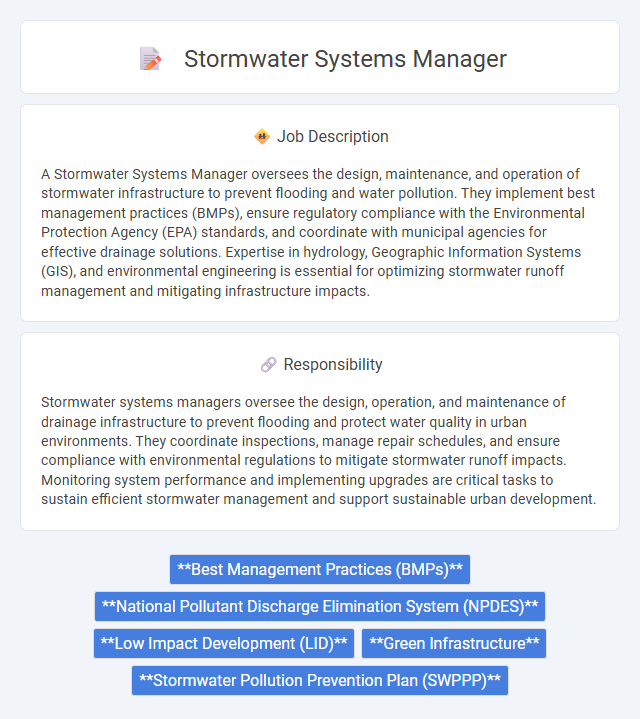
A Stormwater Systems Manager oversees the design, maintenance, and operation of stormwater infrastructure to prevent flooding and water pollution. They implement best management practices (BMPs), ensure regulatory compliance with the Environmental Protection Agency (EPA) standards, and coordinate with municipal agencies for effective drainage solutions. Expertise in hydrology, Geographic Information Systems (GIS), and environmental engineering is essential for optimizing stormwater runoff management and mitigating infrastructure impacts.
Candidates with a strong attention to detail and problem-solving skills are likely suitable for a Stormwater Systems Manager role, as the job demands regular assessment and maintenance of infrastructure to prevent flooding and environmental damage. Individuals comfortable with both fieldwork and technical data analysis may find this position aligns well with their capabilities. Those who prefer less dynamic or outdoor-oriented tasks might struggle with the diverse responsibilities and on-site inspections typical of this role.
Qualification
A Stormwater Systems Manager must possess a strong background in civil or environmental engineering, with professional certifications such as Professional Engineer (PE) preferred. Expertise in stormwater management practices, regulatory compliance including Clean Water Act standards, and proficiency with hydrological modeling software like EPA SWMM is essential. Strong project management skills, along with experience in environmental permitting and infrastructure maintenance, enable effective oversight of stormwater systems and mitigation of urban runoff impacts.
Responsibility
Stormwater systems managers oversee the design, operation, and maintenance of drainage infrastructure to prevent flooding and protect water quality in urban environments. They coordinate inspections, manage repair schedules, and ensure compliance with environmental regulations to mitigate stormwater runoff impacts. Monitoring system performance and implementing upgrades are critical tasks to sustain efficient stormwater management and support sustainable urban development.
Benefit
Stormwater systems manager jobs likely offer benefits such as enhanced community health through effective water quality control and flood prevention. Employees might gain opportunities for professional growth in environmental engineering and regulatory compliance. There is a probability of job stability given the increasing emphasis on sustainable urban infrastructure and climate resilience.
Challenge
Managing stormwater systems likely involves navigating complex regulatory requirements and environmental standards, which can pose significant challenges in ensuring compliance. The role probably demands addressing unpredictable weather patterns and infrastructure limitations, increasing the difficulty of effective flood prevention and water quality management. It is expected that balancing budget constraints with the need for innovative solutions will further complicate the responsibilities of a stormwater systems manager.
Career Advancement
Stormwater systems managers oversee the design, implementation, and maintenance of stormwater infrastructure, ensuring compliance with environmental regulations and effective water management. Career advancement opportunities include roles such as senior project manager, environmental compliance director, or urban water resources director, often requiring certifications like Professional Engineer (PE) or Certified Stormwater Manager (CSM). Expertise in GIS technology, hydrologic modeling, and regulatory frameworks significantly enhances prospects for leadership positions in municipal, environmental consulting, or construction firms.
Key Terms
Best Management Practices (BMPs)
Stormwater systems managers implement Best Management Practices (BMPs) to control pollutant runoff and improve water quality in urban and rural environments. Key BMPs include rain gardens, permeable pavements, detention basins, and vegetated swales, designed to reduce flooding and promote infiltration. Effective BMP management requires routine inspection, maintenance, and adaptive strategies to comply with environmental regulations and enhance stormwater infrastructure sustainability.
National Pollutant Discharge Elimination System (NPDES)
A Stormwater Systems Manager oversees the implementation and compliance of the National Pollutant Discharge Elimination System (NPDES) permit requirements to control stormwater pollution. This role involves developing and managing stormwater pollution prevention plans (SWPPPs), coordinating inspection and monitoring activities, and ensuring local programs meet Environmental Protection Agency (EPA) standards. Expertise in regulatory reporting, best management practices (BMPs), and inter-agency collaboration is essential for maintaining NPDES compliance and protecting water quality.
Low Impact Development (LID)
Stormwater systems managers specializing in Low Impact Development (LID) design and implement sustainable drainage solutions that mimic natural hydrology to reduce runoff and improve water quality. They oversee the installation and maintenance of green infrastructure elements such as bioswales, rain gardens, permeable pavements, and green roofs to manage stormwater on-site. Expertise in environmental regulations, hydrologic modeling, and urban planning is essential to ensure compliance and optimize LID effectiveness in urban environments.
Green Infrastructure
Stormwater Systems Managers specialize in designing and maintaining green infrastructure solutions such as bioswales, rain gardens, and permeable pavements to manage urban runoff effectively. Their expertise ensures sustainable stormwater management by reducing flooding, improving water quality, and enhancing groundwater recharge. Proficiency in environmental regulations and GIS technology is essential for optimizing the performance of green infrastructure projects.
Stormwater Pollution Prevention Plan (SWPPP)
A Stormwater Systems Manager plays a critical role in developing and implementing the Stormwater Pollution Prevention Plan (SWPPP) to control runoff and prevent contaminants from entering water bodies. This professional ensures compliance with the Environmental Protection Agency (EPA) regulations and local stormwater management standards through site inspections, monitoring, and maintenance of stormwater infrastructure. Expertise in best management practices (BMPs), erosion control measures, and pollutant source identification is essential to effectively reduce stormwater pollution and protect public health and ecosystems.
 kuljobs.com
kuljobs.com